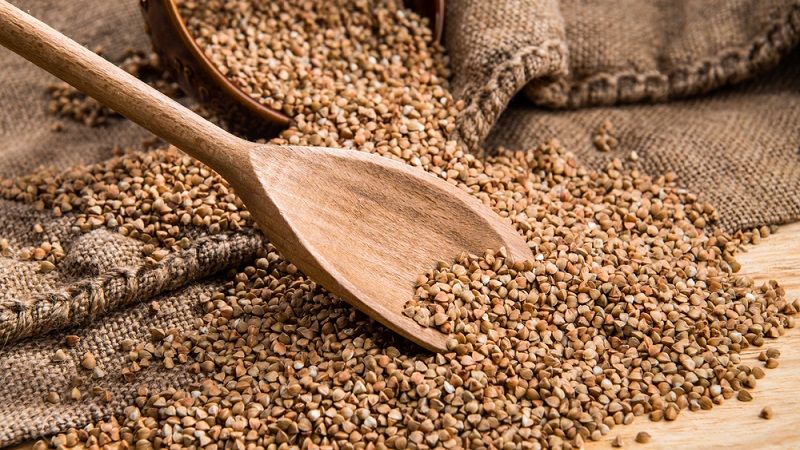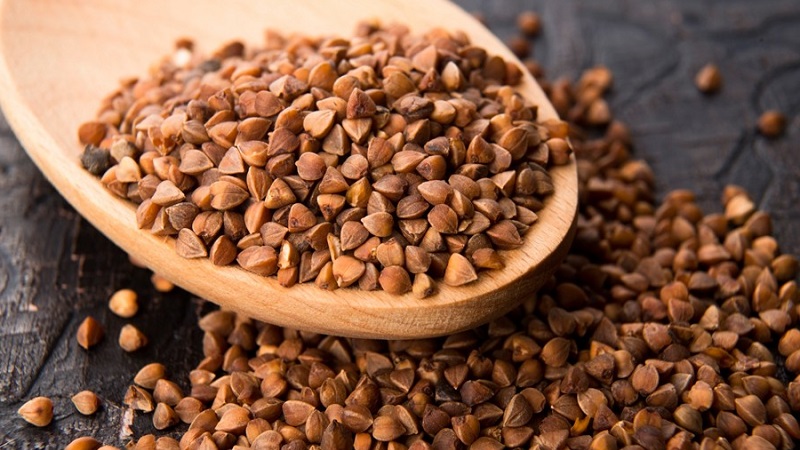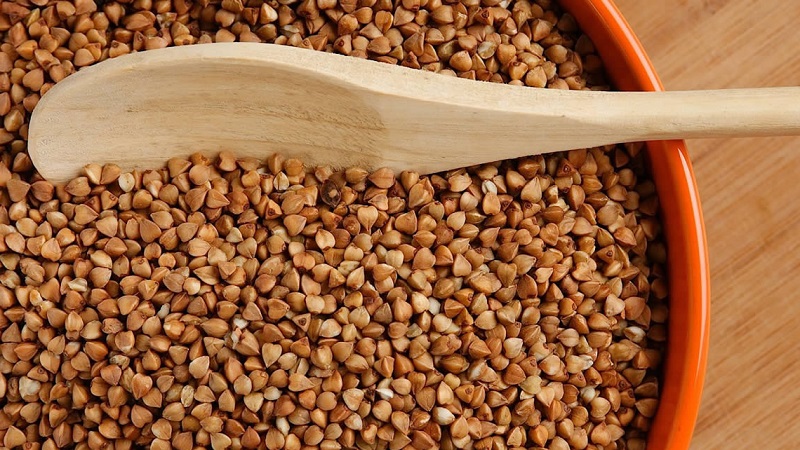What vitamins and minerals are contained in buckwheat
Though buckwheat considered a primordially Russian product, in many modern families it is not a frequent guest on the table. However, before deciding whether to eat buckwheat porridge or not, you should familiarize yourself in more detail with its chemical composition and properties.
About what useful substances are contained in buckwheat and what harm it can bring, read on.
The content of the article
Nutritional value of buckwheat
No wonder buckwheat is included in many diets for weight loss, because it calorie content very small - 313 kcal per 100 g (we are talking about cereals boiled in water). It is free of trans fats and cholesterol.
Important! Calorie content of buckwheat porridge depends on how it was cooked: in water or milk, added butter or not.
The ratio of proteins, fats and carbohydrates in 100 g of cooked cereals: proteins - 4.2 g (16% of the daily value), fats - 1.1 g (3%), carbohydrates - 21.3 g (4%). The amount of protein (protein) is close to the daily requirement for humans.
 Buckwheat proteins contain amino acids (lysine and methionine), which are easily absorbed by the body. Therefore, this product, despite its low calorie content, gives a feeling of fullness for a long time, for which athletes love it. And for vegetarians, it completely replaces meat.
Buckwheat proteins contain amino acids (lysine and methionine), which are easily absorbed by the body. Therefore, this product, despite its low calorie content, gives a feeling of fullness for a long time, for which athletes love it. And for vegetarians, it completely replaces meat.
The complex carbohydrates contained in buckwheat are processed by the body for a long time, therefore they do not cause jumps in insulin in the blood.
Glycemic index this cereal varies from 50 to 60 units, which makes it an indispensable product in dietetics.
What vitamins does buckwheat contain?
Buckwheat is rich in water-soluble B vitamins: B1, B2, B5, B6, B9. It also contains vitamins E, H, PP. There are no fat-soluble vitamins in cereals.
Minerals
The cereal contains almost all the minerals necessary for the body: potassium, magnesium, zinc, selenium, copper, manganese, iron, chlorine, sulfur, iodine, chromium, fluorine, molybdenum, boron, vanadium, tin, titanium, silicon, cobalt, nickel.
Iron contributes to the formation of red blood cells. It helps fight anemia and also maintains a healthy complexion. Calcium is responsible for the strength of bone tissue, reduces brittle nails and makes hair beautiful. Potassium regulates blood pressure, while magnesium helps fight depression.
The presence of vitamin P, or rutin, in buckwheat makes it an indispensable product for maintaining health. Rutin strengthens the walls of the arteries, makes them elastic, reduces capillary fragility and enhances the effect of ascorbic acid (vitamin C), which improves the function of the thyroid gland and the work of the heart, strengthens blood vessels.
Important! This cereal does not contain glutentherefore it can be used by people with celiac disease.
Useful properties of buckwheat for the human body

Due to the balanced rich content of vitamins and microelements, buckwheat has a variety of positive effects on the functioning of organs and systems:
- reduces the level of bad cholesterol in the blood;
- increases the body's resistance to colds;
- participates in hematopoiesis;
- reduces swelling;
- relieves inflammation of the mucous membranes in diseases of the gastrointestinal tract;
- promotes weight loss (fasting days can be carried out on buckwheat);
- lowers blood sugar;
- relieves insomnia and allergies (for this, stuff the pillow with buckwheat husk).
Buckwheat is also used in cosmetology - it is added to nourishing masks for the skin.
Reference. Buckwheat is a good honey plant: about 100 kg of honey is harvested from 1 hectare. Dark honey helps to cure bronchitis and laryngitis.
Harm and contraindications

The main contraindication to the use of buckwheat is an allergy to it, which is very rare (buckwheat is hypoallergenic)... But it is introduced into the diet of young children, as always, with caution, like other new products. They start feeding with grated buckwheat porridge not earlier than six months of age.
In case of gastrointestinal diseases, this product is not recommended to be consumed in large quantities. A portion of boiled cereal 100 g 2-3 times a week is enough.
The use of vitamin P, which is contained in buckwheat, is contraindicated in case of increased blood clotting.
Conclusion
If you want you and your family to be healthy, add buckwheat dishes to your diet. The composition of vitamins and minerals in this cereal easily replenishes the daily requirement of many useful substances. Buckwheat porridge is especially needed for children, the elderly and those who suffer from chronic gastrointestinal diseases.